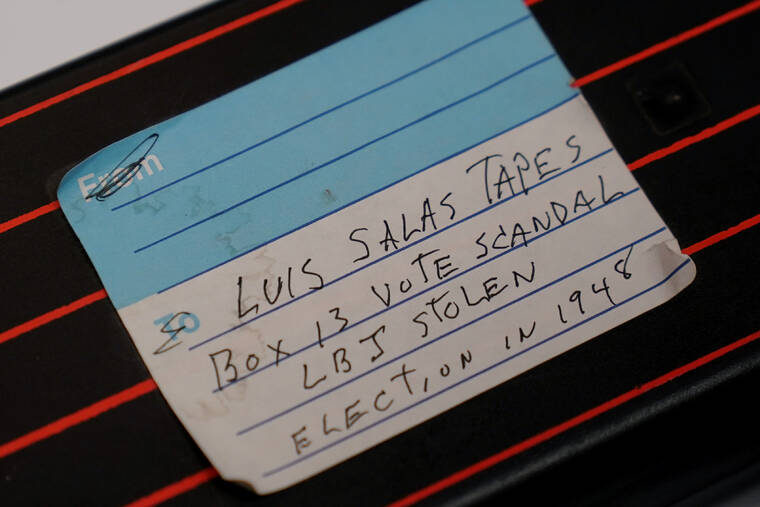‘Window into history’: Tapes detail LBJ’s stolen election
DALLAS — The story was a blockbuster: A former Texas voting official was on the record detailing how nearly three decades earlier, votes were falsified to give then-congressman Lyndon B. Johnson a win that propelled the future president into the U.S. Senate.
The audio recordings from Associated Press reporter James W. Mangan’s interviews for the 1977 story were posted this week on the LBJ Presidential Library and Museum’s archival website, Discover LBJ. After Mangan’s death in 2015 at the age of 87, his family found the labeled cassette tapes at his San Antonio home and donated them last summer to the library on the campus of the University at Texas at Austin.
Luis Salas, the former South Texas election judge, told Mangan for the story: “Johnson did not win that election; It was stolen for him. And I know exactly how it was done.”
The story, which made front pages across the country, pulled back the curtain on the razor-thin victory that had drawn suspicions ever since election officials in rural Jim Wells County announced the discovery of uncounted votes in a ballot box known as Box 13 in the days after the 1948 Democratic primary Senate runoff. And now, at a time when election fraud is rare but former President Donald Trump and his allies amplify baseless allegations blaming it for his 2020 loss, the tapes and story show what compelling evidence of actual fraud looks like.
Mangan’s son, Peter, said listening the tapes was like getting “a little window into history.”
On one cassette, he said, it sounds like his father is in his car, reciting what he’d just been told.
“You can hear cars going by and he’s kind of, you can tell he’s a little excited, because I think he finally got the goods,” Peter Mangan said.
Mark Lawrence, the library’s director, said the recordings are “deeply connected to one of the big mysteries and controversies that’s hung around LBJ for decades.” In a 1984 oral history that Salas gave to the library, he said one of the reasons he finally decided to talk was because he had been quite ill.
Mangan said in a 2008 AP story that as he worked to convince Salas to go on the record, he told him: “If you die, history will never know what happened.”
Lawrence said much is now known about Box 13, thanks to both Mangan’s 1977 story and research done later by LBJ biographer Robert Caro, who “essentially reaffirmed” Mangan’s story and built on it.
“The kinds of irregularities we can see were at work in the 1948 Senate race in Texas were, I think it’s fair to say, pretty widespread across American history and all regions of the country to one extent or another but certainly in the South and along the Mexican borderlands, as recently as the 1940s,” Lawrence said.
Salas told Mangan that the powerful South Texas political boss George B. Parr — who wielded control with favors and coercion — ordered that some 200 votes be added to Box 13. Salas said he then watched as the fraudulent votes were added in alphabetical order, with the names coming from people who hadn’t voted in the election.
The new votes gave Johnson the primary victory over then-Gov. Coke Stevenson by an 87-vote margin. Johnson — subsequently bestowed with the nickname “Landslide Lyndon” — went on to easily defeat the Republican in the general election, long before the GOP became the dominant force in Texas politics.
Johnson, elected to the U.S. House in 1937, had run for U.S. Senate in 1941 and lost to then-Gov. Wilbert Lee “Pappy” O’Daniel in an election widely accepted by historians to have been corrupt, Lawrence said.
“The standard story that gets told, and I think there’s an awful lot to it, is that when LBJ’s second chance comes along in 1948, he’s determined not to have the election stolen from him again,” Lawrence said.
Lawrence said the 1948 Senate victory “catapults” Johnson to national attention. Johnson became then-President John F. Kennedy’s vice president and was sworn in as president Nov. 22, 1963, after Kennedy was assassinated in Dallas. Johnson was elected president in 1964. He decided not to run again in 1968 and died of a heart attack in 1973 at the age of 64.
Lawrence said that while the Box 13 incident shows that “LBJ was willing to do what he had to do to maintain political power,” he was also a man who, “when he had the opportunity, he was more inclined to act on principle.” Lawrence noted Johnson’s efforts to “ensure that people were able to vote in fair and equitable elections.”
In 1965, Johnson signed the Voting Rights Act, which outlawed practices designed to disenfranchise Black voters by banning literary tests and poll taxes. The act also gave the federal government the authority to take over voter registration in counties with a pattern of persistent racial discrimination, although that is no longer the case after the U.S. Supreme Court struck down the requirement in 2013.
James Mangan retired from AP on Jan. 1, 1989, after a 36-year career with the company that took him to cities across the U.S. and to Europe. With each move, Peter Mangan said, his father held on to the Box 13 tapes.
“He always kept these,” he said, “so I know they must have been important to him.”

